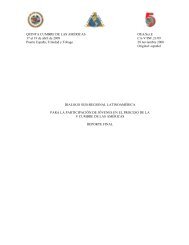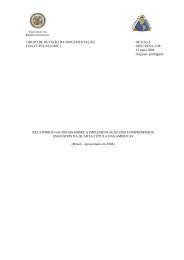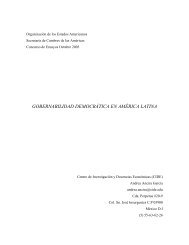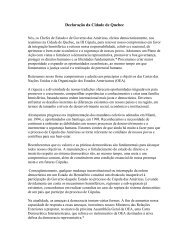The Road to Hemispheric Cooperation: Beyond the Cartagena
The Road to Hemispheric Cooperation: Beyond the Cartagena
The Road to Hemispheric Cooperation: Beyond the Cartagena
Create successful ePaper yourself
Turn your PDF publications into a flip-book with our unique Google optimized e-Paper software.
INTRODuCTION<br />
Ted Piccone I Senior Fellow and Deputy Direc<strong>to</strong>r for Foreign Policy, Brookings Institution<br />
A Hemisphere in flux<br />
For <strong>the</strong> United States, <strong>the</strong> tumult exhibited at this spring’s<br />
Sixth Summit of <strong>the</strong> Americas in <strong>Cartagena</strong>, Colombia was<br />
an unfortunate but increasingly common display of <strong>the</strong> shifting<br />
templates of contemporary inter-American relations.<br />
From <strong>the</strong> high point of <strong>the</strong> Miami Summit in 1994—when a<br />
convergence of his<strong>to</strong>ric transitions <strong>to</strong> democracy and more<br />
open economies gave birth <strong>to</strong> an ambitious hemispheric<br />
agenda of cooperation across multiple sec<strong>to</strong>rs—<strong>to</strong> <strong>the</strong> failure<br />
in <strong>Cartagena</strong> <strong>to</strong> reach agreement on a final declaration,<br />
plus an embarrassing scandal involving U.S. Secret Service<br />
agents, regional diplomacy has grown ever more fractious<br />
and deadlocked. <strong>The</strong> fragmenting poles of power and influence<br />
in <strong>the</strong> region—a rising Brazil, a combative alliance led<br />
by Venezuela, a weakened Central America bogged down<br />
by economic stagnation and criminal violence, a struggling<br />
Mexico adapting <strong>to</strong> global forces and a new president, and<br />
a distracted and despondent United States, not <strong>to</strong> mention<br />
<strong>the</strong> pull of new ac<strong>to</strong>rs like China and <strong>the</strong> downcast eyes of<br />
old ac<strong>to</strong>rs like Europe—translate in<strong>to</strong> a frustrating competition<br />
for leadership and growing doubts about <strong>the</strong> usefulness<br />
of pursuing a hemispheric agenda.<br />
At least that is how it looked from <strong>the</strong> headlines in Washing<strong>to</strong>n,<br />
which focused on <strong>the</strong> contentious debates around<br />
U.S.-Cuban relations, <strong>the</strong> “war on drugs,” and even <strong>the</strong><br />
long-simmering Malvinas/Falklands dispute that marked <strong>the</strong><br />
<strong>Cartagena</strong> ga<strong>the</strong>ring. <strong>The</strong>se are longstanding and legitimate<br />
disagreements that deserve recognition and serious hemispheric<br />
diplomacy. But <strong>the</strong>y should not stand in <strong>the</strong> way of<br />
o<strong>the</strong>r important business on <strong>the</strong> regional agenda, issues<br />
that range from economic innovation and trade <strong>to</strong> public<br />
security, education reform, and energy and climate change.<br />
<strong>The</strong>se are <strong>the</strong> subjects that will determine whe<strong>the</strong>r countries<br />
of <strong>the</strong> region are able <strong>to</strong> move <strong>to</strong>ge<strong>the</strong>r in<strong>to</strong> <strong>the</strong> 21st century<br />
as meaningful partners with a common vision for win-win<br />
solutions. <strong>The</strong>y merit more attention and discussion in every<br />
capital of <strong>the</strong> hemisphere and at <strong>the</strong> heads of state level.<br />
To flesh out <strong>the</strong> best ideas in each of <strong>the</strong>se areas, <strong>the</strong><br />
Brookings Latin America Initiative commissioned a series<br />
of working papers from leading experts in <strong>the</strong> United<br />
States and <strong>the</strong> region. <strong>The</strong> group, joined by senior<br />
officials from <strong>the</strong> Obama administration and a host of<br />
Brookings and o<strong>the</strong>r scholars, <strong>the</strong>n came <strong>to</strong>ge<strong>the</strong>r for<br />
discussion at an all-day workshop in <strong>the</strong> lead-up <strong>to</strong> <strong>the</strong><br />
<strong>Cartagena</strong> Summit. Based on <strong>the</strong> rich conversation that<br />
ensued, and <strong>the</strong> results of <strong>the</strong> summit itself, <strong>the</strong> authors<br />
prepared longer versions of <strong>the</strong>ir work, with <strong>the</strong> aim of<br />
providing deeper and up-<strong>to</strong>-date treatment of each <strong>to</strong>pic<br />
as well as a roadmap for hemispheric cooperation.<br />
Looking ahead <strong>to</strong> <strong>the</strong> next summit, scheduled for 2015 in<br />
Panama, <strong>the</strong> overarching question is whe<strong>the</strong>r states can<br />
summon <strong>the</strong> political will <strong>to</strong> manage <strong>the</strong>ir differences in a<br />
way that will not block cooperation in o<strong>the</strong>r important areas.<br />
<strong>The</strong> current signals, however, are not encouraging. Cuba,<br />
<strong>the</strong> lost cousin of <strong>the</strong> inter-American family, will remain a divisive<br />
issue because some states want it <strong>to</strong> be invited even<br />
though it does not meet <strong>the</strong> region’s democratic criteria for<br />
inclusion. This disagreement should become a catalyst for<br />
developing a road map for engagement that would outline<br />
<strong>the</strong> steps Havana could take <strong>to</strong> demonstrate its commitment<br />
<strong>to</strong> <strong>the</strong> region’s core values. Such an initiative would<br />
be a good test of <strong>the</strong> hemisphere’s true commitment <strong>to</strong> its<br />
identity as a club of democracies. It might learn something<br />
from <strong>the</strong> successful experience of <strong>the</strong> Association of Sou<strong>the</strong>ast<br />
Asian Nations (hardly a chorus of democracies), which<br />
denied Myanmar a meaningful role in <strong>the</strong> organization until<br />
it under<strong>to</strong>ok important political reforms. Instead of taking<br />
this kind of nuanced approach, friends of Cuba in <strong>the</strong> ALBA<br />
bloc (Venezuela, Ecuador, Bolivia, Nicaragua, and o<strong>the</strong>rs),<br />
vowed not <strong>to</strong> attend <strong>the</strong> 2015 summit if Cuba were not included.<br />
<strong>The</strong>y adopted this position after <strong>the</strong>y failed <strong>to</strong> win<br />
support for a boycott of <strong>the</strong> <strong>Cartagena</strong> Summit if Cuba were<br />
not invited (thanks in part <strong>to</strong> Colombian President Juan<br />
Manuel San<strong>to</strong>s’s deft handling).<br />
<strong>The</strong> <strong>Road</strong> <strong>to</strong> <strong>Hemispheric</strong> <strong>Cooperation</strong>: <strong>Beyond</strong> <strong>the</strong> <strong>Cartagena</strong> Summit of <strong>the</strong> Americas<br />
<strong>The</strong> Brookings Institution ❘ Latin America Initiative<br />
5








